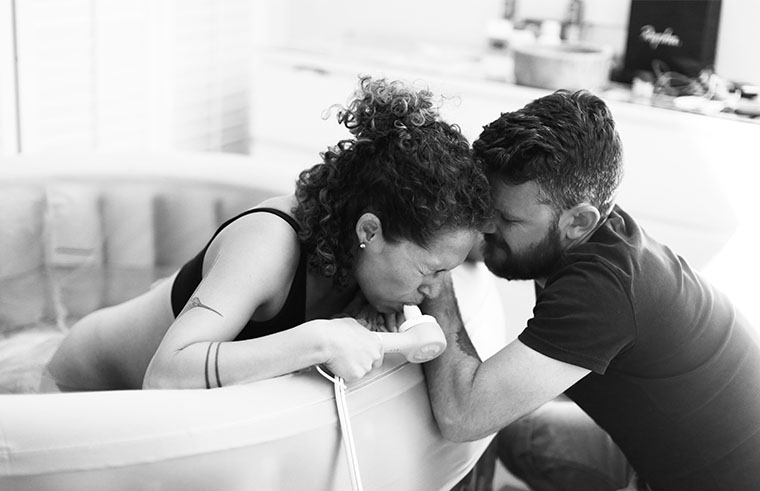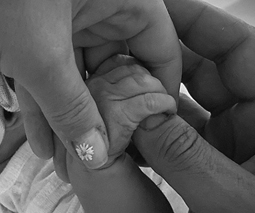13 ways new dads (and mums) can support their partner giving birth

Giving birth is a momentous and often daunting time, so having the support of a partner is essential for a mum-to-be to go into labour feeling strong, brave and ready.
But apart from holding her hand and feeding her ice chips, what else can non-birthing partners do to support mums during the birth?
The truth is, if a partner is going to be a support figure in the birthing suite, there’s a lot more he (or she – this is equally as relevant for same sex partners who want to support the parent giving birth) can do to help. Being a support person for a woman during labour is long, intense work and requires someone to be seriously up to the task. A large part of this role is about being an advocate during labour and birth. Once labour is in full swing, the last thing she’ll want to be doing is chatting to the obstetric team about how she wants the birth to go. Birthing mums have just one job on the big day: to deliver the baby. This will require all their focus.
As a partner, you need to be her advocate, cheer squad and pillar of strength, so she can feel comfortable and in control as much as possible as she concentrates on bringing your baby into the world.
Here are 13 ways you can support your partner during the birth:
1. Attend birthing classes together
Supporting your partner during the birth starts way before the onset of labour. Attending birth classes will help you both understand the process of labour and birth so you have a fair idea of what to expect. Use this time to ask all the questions you need – knowledge is powerful and if you want to be a pillar of strength for your partner during labour, you’re going to need to absorb as much information as possible.
2. Tour the birth suite
Book in a tour of your local hospital’s birthing unit, so you know what to expect when it’s time to be admitted. Often these places can feel daunting and intimidating because everything is so unfamiliar. Get acquainted with the hospital your baby will be born in so you can take this out of the equation on your day.
3. Talk with other couples
Spend time with other couples who have recently given birth, so you can hear their experience and gain some tips, which will be especially helpful if they birthed in the same hospital that you’ll be using. If your friends haven’t had a good experience, you can still benefit from their story by asking what they would have done differently, or bringing up the topic with the educator running your birth class or at your next midwifery check-up.
4. Write your birth plan together
Your birth plan should be created with your partner, so you can understand her hopes and wishes for the birth, as well as express your own (remembering that her bodily autonomy is the most important part of the equation here). Once you have a firm understanding of how you both want things to go, you’ll be better able to advocate for your partner during labour.
5. Consider using a doula
Watching your partner give birth isn’t going to be easy, and there’s nothing to be ashamed of if the whole idea makes you stressed and worried. If you’re concerned about being the solo support person in the room, it’s worth considering hiring a birth doula who can support you both during labour. First labours are often long, drawn-out ordeals, and planning for the best support during the long haul is a good idea.
6. Discuss a plan for coping if things don’t go as hoped
Birth can be unpredictable, and despite your best laid plans, things might not go as expected. Before the big day arrives, discuss how each of you will feel if your birth plan doesn’t come off, for example, if you need pain relief, need to be internally monitored or a caesarean section is advised. Talk with each other about how you’ll approach scenarios like these so they don’t catch you off guard if they happen, and remember that your job is to help your partner feel comfortable no matter what unexpected situation arises.
7. Look cool and calm
Even if you’re not feeling it, try to appear cool, calm and collected during the labour, which will help your partner feel like things are under control. Similarly, come up with some key phrases that will keep her feeling cheered on and positive when she is feeling exhausted and just wants to call it a day.

8. Remind your partner of her goals
Your partner probably has certain goals in mind for the birth – remind her about them, as these can be swept aside in the heat of the moment. For example, if she wanted to avoid pain relief, but finds herself asking for an epidural, you could gently remind you how well she is doing without it and help her realign her focus. This is easier said than done, of course, and remember that if she still wants the pain relief, that’s just as valid a choice.
9. Communicate with staff
Make sure you are well-versed with the birth plan the two of you came up with. In the delivery suite, it’s your job to make sure this is communicated with whoever comes in to look after your partner. Often midwives will change shifts and new people will introduce themselves to the two of you – you need to make your partner’s wants and needs clear with each and every staff member.
10. Explain advice
It’s not your partner’s job to interpret medical speak during her birth. Listen to the advice being offered, ask questions to increase your understanding and then bring it back to your partner, explaining it in a clear way that she can understand.
11. Help make decisions if things don’t go to plan
Part of your birth plan formation needs to cover what your approach will be if things don’t go to plan. If something comes up during the birth that requires a decision from your partner, you can help remind her of the birth plan and support her to consider the options and select the one that suits her best.
12. Be her voice
Your partner may get to a point during the labour where she is unable to speak because she’s so focussed on breathing and making it through contractions. In fact the best thing she can do if she is in lots of pain is ignore what’s going on around her and tune into her body. When and if this happens, you need to be her voice, speaking up for her when necessary while she sticks to her important job, knowing that you have her back.
13. Debrief the experience
Whatever happens during the birth, it can leave some lingering feelings for your partner and indeed for you. You may have felt helpless and scared watching your partner in pain. Talk about the labour and birth and be sure to share how you both felt so you can move forward together. Harbouring strong feelings won’t make them go away and could even contribute to postpartum depression or anxiety, which affects partners as well as new mums.
This post was originally published in April 2018.
 Join the Bump and Baby: The Fourth Trimester online event! With live expert sessions, FREE newborn routine guide & the chance to WIN a $500 Nursery gift voucher. Click here to find out more and make sure you don’t miss a thing!
Join the Bump and Baby: The Fourth Trimester online event! With live expert sessions, FREE newborn routine guide & the chance to WIN a $500 Nursery gift voucher. Click here to find out more and make sure you don’t miss a thing!









